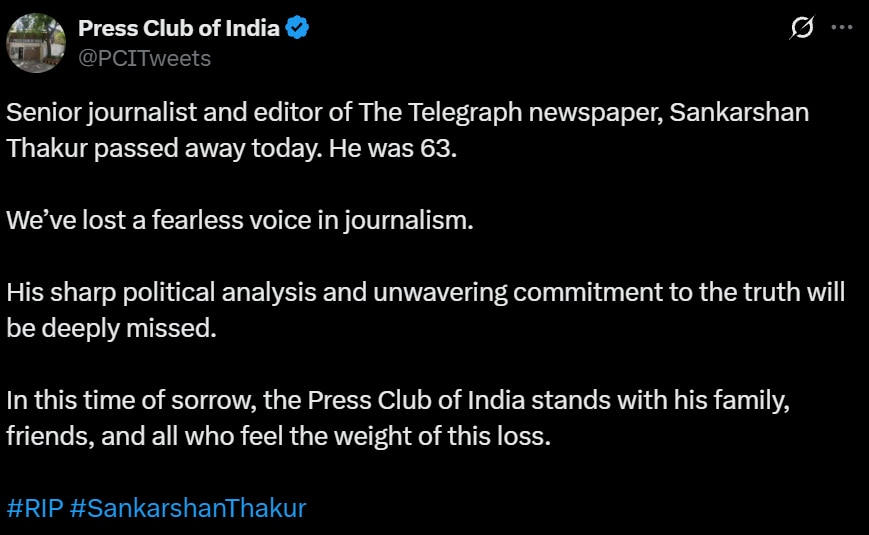Farewell To Sankarshan Thakur: A Journalist Who Never Left The Ground
Sankarshan Thakur was a rare voice in Indian journalism, deeply rooted in field reporting, fearless in analysis, and unwavering in truth. He died on September 8, 2025, at the age of 63, a sudden and irreparable loss for the profession.
He returned to The Telegraph in 2009 after successful stints with other national dailies. Soon after, he was appointed Editor, officially taking the helm on October 1, 2023. Known as the Delhi-based Roving Editor, he brought unmatched energy from the field into the newsroom, covering politics, Bihar, Kashmir, and the subcontinent’s complex socio-political conflicts.
Over nearly four decades, Thakur reported on some of the most defining moments of Indian history: the Kargil conflict, the turmoil in Kashmir, the Bhopal gas tragedy, the 1984 anti-Sikh riots, Indira Gandhi’s assassination, conflicts in Sri Lanka, and the Maldives coup. His firsthand reporting from the Kargil warfront remains especially noted for its clarity and depth.
Tributes Pour In
Congress leader Jairam Ramesh called him “a delightfully brilliant writer” and “one of the strongest defenders of liberal, secular, and pluralistic India.”
Telangana Chief Minister A Revanth Reddy described his passing as “an untimely demise” and “a significant loss to journalism.”
Former Jammu and Kashmir Chief Minister Omar Abdullah recalled Thakur as one of the few journalists who travelled widely across the region and listened without judgment.

A Grounded Editor
Tributes from peers and protégés painted him as an editor who never stayed away from the field. Journalist Saba Naqvi remembered him working shoulder to shoulder with reporters during the 2024 General Election in scorching heat. “That’s what makes a great journalist,” she said.
As an author, Thakur chronicled Bihar’s political culture in acclaimed works such as Subaltern Saheb: The Making of Laloo Yadav, Single Man: The Life and Times of Nitish Kumar, and The Brothers Bihari. His writing went beyond headlines to offer rich portraits of political lives.
Winner of the 2001 Prem Bhatia Award for excellence in political journalism, he also received the Appan Menon Fellowship in 2003 for his work on Kashmir. For him, journalism was never just a profession but a blend of passion, empathy, and integrity.
India has lost someone formidable, a writer and editor who never parted from the field or his principles. As the world bids farewell to Sankarshan Thakur, journalism takes solace in knowing that his courage and values will endure for generations.
india